




"We are expanding health care access by partnering with several campus departments and local organizations."






"We are expanding health care access by partnering with several campus departments and local organizations."
THERE HAS BEEN A GREAT DEAL OF EXCITEMENT since we published our last On+Call magazine. The gift naming the Dorothy and Jim Kennedy Health Sciences Building is by far the largest in the School of Nursing’s history. This $8 million donation from the Kennedy Foundation has generated the momentum we need to finish raising the needed funds to make the new home for the school a reality. We are so appreciative to the Kennedy Family for this transformational gift. You will read about the groundbreaking in this issue. While simulation and technology-enhanced classrooms will be the cornerstone of the building, we are proud to announce that our simulation center here in Metro has been granted endorsement, the first step to full accreditation of our Simulation Center. While the Metro lab is busy every day, all day, students are able to use cutting-edge technology, allowing them to be in high-stakes, low-risk, real-world clinical settings, which leads to excellent practice-ready, BSN-prepared registered nurses and Advanced Practice Registered Nurses. Our pass rates remain well above the state and national average for all programs. Just wait until we are in our new building—the sky is the limit for simulation and instruction for all programs!
On campus, we graduated our first cohort of ABSN students in August 2024. Ten of the 15 graduates remained in Chattanooga. As you are reading this, cohort No. 2 is finishing up courses and clinical rotations and will graduate in December, while cohort No. 4 will be completing their first semester. We are continuing our efforts in outreach to our community and beyond. A new program at the Hamilton County Jail, thanks to Dr LaTisha Toney’s efforts, allows our students to gain valuable clinical experience working with inmates in a challenging, real-world environment. Dr. Kristi Wick and her team are preparing to take delivery on the Mobile Health Unit, which will visit 10 surrounding underserved areas and provide care for our aging population. The interprofessional focus of this effort is expanding health care access by partnering with several departments (PT, OT and Social Work come to mind) on campus and local organizations—such as churches and senior centers— for screenings and referrals that residents may not get otherwise. This is a wonderful opportunity for our undergraduate and graduate students to collaborate and make a significant impact.
Finally, we are pleased that Dr. Ken Grubbs, a School of Nursing graduate, has been honored as UTC’s outstanding alumni for 2024. Dr. Grubbs will be speaking at UTC’s graduation, and we will hear first-hand about his journey from student to emergency department nurse to national health care leader.
As you will see from reading this issue, we are extremely excited about the path we are on. Please feel free to come by and contact us if you wish to hear about all that is happening here in Metro.


Christine Benz Smith, Ph.D., APRN, FNP-BC Director, School of Nursing Chief Health Affairs Officer
As the UTC School of Nursing continues to grow, we are excited to introduce four new members to our team who bring a wealth of experience, knowledge and passion to our community.
These individuals come from diverse backgrounds but share a common commitment to educating the next generation of nurses. Whether in the classroom, clinical settings or administrative roles, they’re already making a positive impact on both students and health care.
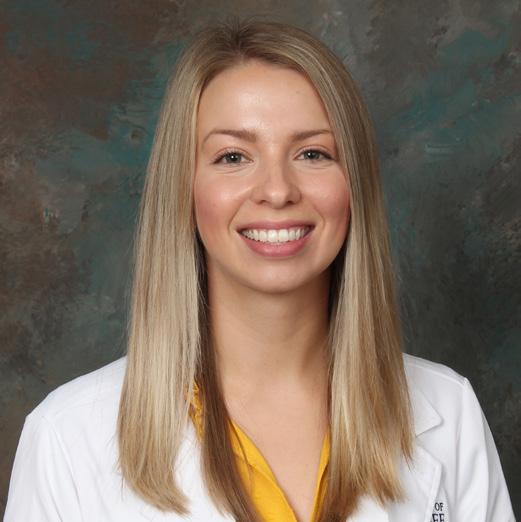
Hannah Barger, DNP, MBA, RN • Lecturer
Dr. Hannah Barger brings her experience as a clinical nurse coordinator from UTC’s University Health Services—where she worked closely with students and student-athletes managing the clinical lab, training staff, and handling referrals and imaging orders—to her new role in the School of Nursing.
“You won’t find a better group of health care professionals that go the extra mile to care for our students, faculty and staff,” she says. Now teaching in the ABSN program, Barger earned an MBA at UTC with a focus on nursing management. She hopes to use these skills to equip her students to become “difference makers” regardless of the specialty they choose.
She enjoys working with ABSN students, mainly because of their diverse backgrounds and strong determination. “Each cohort brings unique experiences, and I know they’ll succeed,” she says. In her teaching, she emphasizes the importance of selfcare, reminding students that to care for others effectively, they must take care of themselves first.
If she weren’t in nursing, she’d likely own a bakery, combining her love of baking with a fun, entrepreneurial challenge.
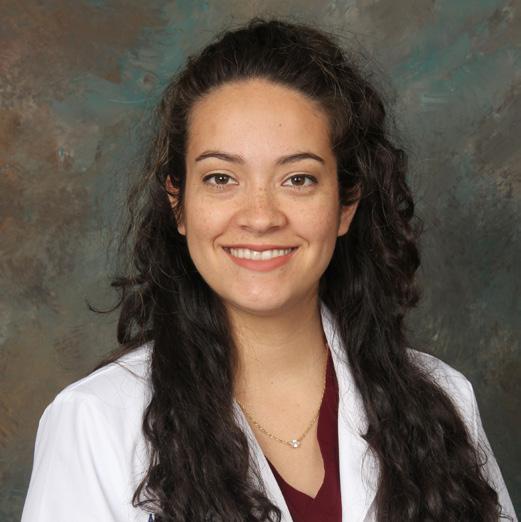
Marisa Calfee, DNP, FNP-BC • Clinical Assistant Professor
Dr. Marisa Calfee was determined to complete her education and move directly into advanced practice nursing as soon as possible. After working as an RN during the COVID-19 pandemic at Hamilton Healthcare System, she earned her DNP from Lee University in 2022 and transitioned into the role of nurse practitioner. Her passion for learning and helping others naturally led her into teaching.
“I’ve always loved learning and going the extra mile, so teaching felt like the natural next step for me,” she says.
Calfee emphasizes the importance of compassion in nursing, reminding her students, “The moment you stop caring, it’s time to step away.”
Outside the classroom, she enjoys making jewelry and playing guitar. She even played in a band as an undergrad.

Kate McKinney, DNP, APRN, FNP-C • Assistant Professor, Kay K. Chitty Professor
Dr. Kate McKinney “earned her stripes” as an RN at Vanderbilt University Medical Center, where she gained valuable experience working in the operating room and outpatient surgery settings. She also served as a charge nurse, honing her leadership and clinical skills. After completing her DNP, she gained experience both in convenient care and urology. Her move to Chattanooga brought her closer to her hometown of Rome, Georgia, and marked the beginning of her teaching career at UTC. As the Kay K. Chitty professor, McKinney balances her time between teaching at UTC and practicing as a nurse at nearby CHI Memorial, a key component of her professorship.
McKinney is passionate about helping nursing students develop critical thinking skills and compassion for their future roles.
“I love the enthusiasm and energy that nursing students bring,” she says.
When she’s not working, McKinney enjoys spending time with her family and describes her life as “pretty boring, but in the best way,” thanks to her 3-year-old daughter—who keeps her happily busy.
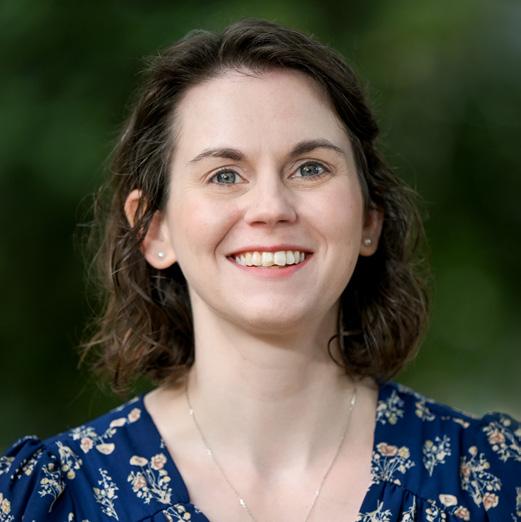
Carrie Wilson • Administrative Associate
Carrie Wilson joined the UTC School of Nursing in September 2024, bringing her organizational skills to the faculty side of the program. As she settles in, she’s eager to get to know the faculty better and find new ways to make their jobs easier.
Before coming to UTC, she worked as an administrative assistant at the Community College of Baltimore County in Maryland, focusing on student services.
Wilson is currently pursuing a master’s degree in American history, with a focus on Irish-American culture and union violence. Her love for history has been a lifelong passion, complementing her career in higher education.
“There’s always been a connection for me between my academic interests and my professional life,” she says.
Though new to UTC, Wilson is already enjoying the vibrant campus atmosphere.
“Chattanooga feels like a small city with big energy, and I’m excited to be part of it and UTC.”


At the bustling corner of Palmetto and 3rd streets, the University of Tennessee at Chattanooga unveiled its vision for a state-of-the-art nursing education facility on what is, for now, a parking lot.
This site will soon transform into the Dorothy and Jim Kennedy Health Sciences Building, anchoring a key segment of Chattanooga’s medical corridor and expanding UTC’s campus footprint.
The groundbreaking ceremony, which took place Monday, Nov. 4, brought together state and federal lawmakers, University leaders, members of the Kennedy family and the very first member of the UTC nursing faculty, highlighting a collaborative effort to address a critical regional need.
“This building isn’t just a place for learning—it’s a promise to our community,” says Dr. Chris Smith, director of the School of Nursing and UTC’s chief health affairs officer. “With this expansion, we can finally meet the demand we’ve been hearing from hospitals and clinics across the region. It’s about preparing nurses who are not only skilled but ready to serve from day one.”
Wayne Peters, attorney for the Kennedy Foundation, Inc., notes the family’s commitment to Chattanooga.
“The Kennedy family has always believed in giving back to the community that has given us so much. This building is a testament to that belief and our dedication to advancing healthcare education in this region,” Peters says.
For UTC Chancellor Steven R. Angle, the project’s success reflects years of strategic planning.
“When we first sat down to strategize about this project, it became clear that focusing on nursing was essential,” he says. “With the support of legislators like Senator Bo Watson and Representative Patsy Hazlewood, we were able to keep this project at the forefront, ensuring its viability in a highly competitive funding landscape.”
Community and state support helped UTC secure the state funding needed to move the building from blueprint to reality. Once completed, the 90,000-square-foot Dorothy and Jim Kennedy Health Sciences Building will address a longstanding need.
With limited space, UTC’s School of Nursing has had to turn away qualified applicants, a trend this new facility aims to reverse.
The building will allow UTC to increase nursing enrollment by over 150%, addressing the urgent need for more health
care professionals in the region. Equipped with simulation labs, dedicated treatment rooms and specialized spaces for intensive care and labor and delivery scenarios, the facility is designed to prepare students to handle the complexities of modern health care.
The Kennedy Foundation’s $8 million gift, the largest single donation in the School of Nursing’s history, has been crucial in making the project possible. The building represents not only an expansion but a milestone, honoring Dorothy and Jim Kennedy while supporting a health care infrastructure in Chattanooga that’s ready for the future.
Beyond nursing, Smith says the new building will be a hub for interdisciplinary learning that will foster collaboration across UTC’s health-related programs.
“We’re establishing a center for excellence in interprofessional education where our nursing students can train alongside those in social work, physical therapy and other fields,” Smith says. “Health care is increasingly collaborative, and our students will be prepared for that realworld expectation of working across disciplines.”
Positioned directly across from Erlanger Health System’s children's outpatient center, the building strengthens ties with Chattanooga’s health care network, creating essential connections for clinical training and hands-on learning.
For the nursing students and faculty who attended the ceremony, the groundbreaking marked a significant milestone.
“On behalf of all of us, thank you for placing your trust in us. We’re ready to meet the high standards set by the community and our field,” Smith says.
As the first UTC building named for a woman alum, the Dorothy and Jim Kennedy Health Sciences Building reflects UTC’s commitment to honoring its graduates’ contributions. The project is funded through a combination of donations and state resources, with a building campaign goal of $21 million. The Kennedy Foundation’s donation, in particular, has brought the vision of this new building to life.
Reflecting on the program’s evolution, Associate Lecturer Laurel Rhyne recalls her early days at UTC’s School of Nursing, when she actively recruited students to fill seats.
“Now, we have a waitlist,” she says. “This new facility is a testament to how far we’ve come and the bright future ahead for our students and the community.”



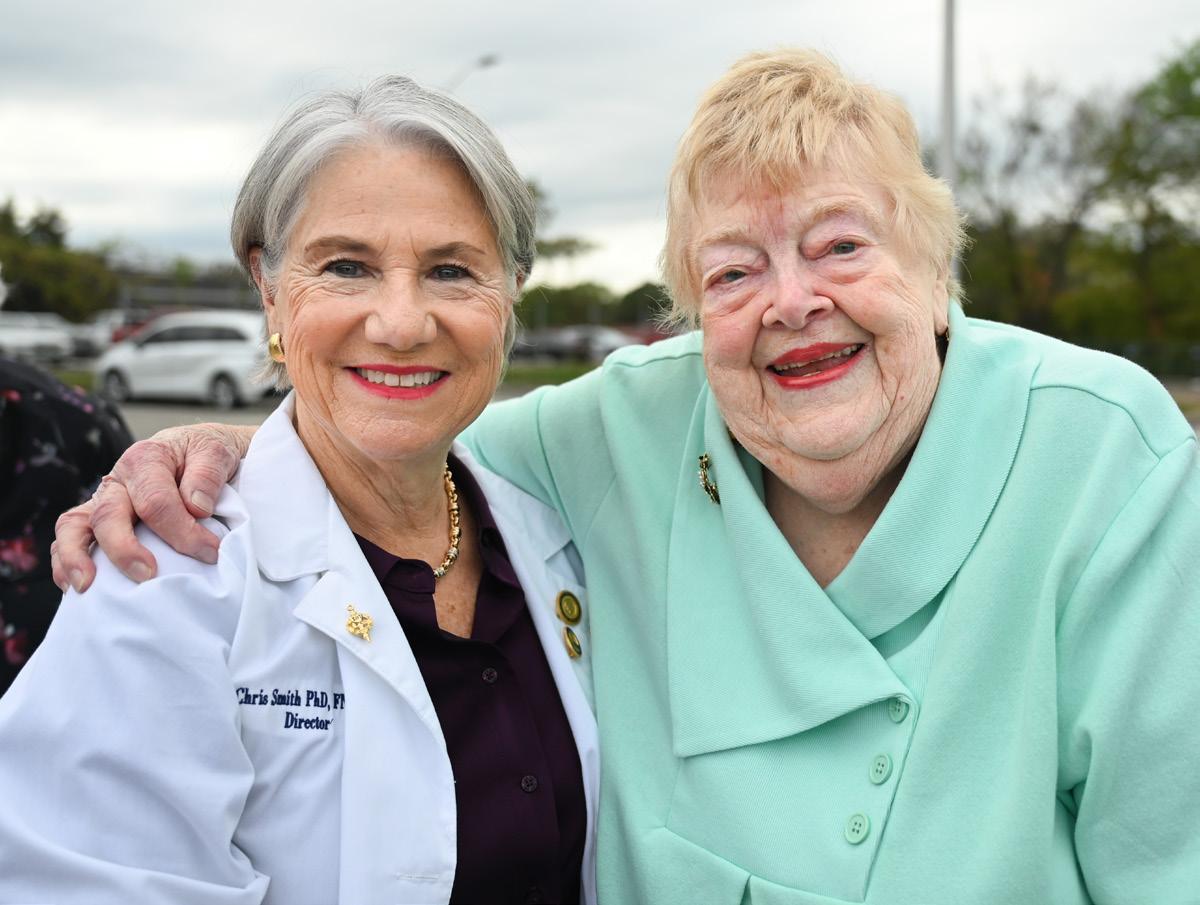
Martha Butterfield’s legacy began with her own “groundbreaking” work at UTC, helping establish nursing as an academic force in Chattanooga.
As the School of Nursing’s first faculty member in 1974, Butterfield joined a small team pushing to elevate nursing from bedside practice to a respected academic discipline.
Her work helped UTC secure state approval in 1976 for what started as the Department of Nursing. The first graduating class came a year later, followed by national accreditation in 1978.
Butterfield’s drive didn’t stop there. In 1983, she secured the School of Nursing’s first gift for a simulation lab, laying the groundwork for the hightech, hands-on training that would become essential to today’s modern nursing curriculum.
At a time when resources were scarce and technology in nursing education was just emerging, her efforts ensured UTC nursing students would enter the field with a level of preparation rarely available elsewhere. And that hasn’t changed.
“We were hard on the students because we wanted them to be the best…and they are the best,” Butterfield says.
“We proved we weren’t just bedpan pushers, that we could think about things. That if this is happening, then I need to be watching for this in my patient, rather than being told what to do.”
On Nov. 4, 2024, at the groundbreaking of the Dorothy and Jim Kennedy Health Sciences Building, one speaker highlighted Butterfield’s enduring impact on the program she helped create.
Chris Smith, School of Nursing director and chief health affairs officer, put it simply: “Martha’s legacy isn’t just in the program she helped build but in the generations of nurses who owe their strength and skill to her vision.”
Butterfield’s presence at the ceremony was a testament to the grit and vision that transformed UTC’s nursing program—a legacy that continues to shape the field today.




The groundbreaking for the Dorothy and Jim Kennedy Health Sciences Building on Nov. 4 was attended by current students, faculty and staff as well as alumni, University and local leaders. Speakers at the event included

The nursing program at the University of Tennessee at Chattanooga is taking bold steps to prepare nursing students for careers outside traditional hospital walls.
Through the AHEAD-RN traineeship led by Dr. Brooke Epperson, associate director of the School of Nursing and the undergraduate program coordinator, eight nursing students are diving into the realities of rural health care. They’re learning that providing quality care in these communities isn’t just about medical skills— it’s about adaptability, cultural sensitivity and resourcefulness in environments where health care access can be severely limited.
The AHEAD-RN traineeship operates in partnership with many of Dr. Kristi Wick’s rural initiatives that deliver health care directly to underserved populations in the region.
“One of the biggest challenges in rural health care education is access to hands-on experiences in these communities,” Epperson says. “With Dr. Wick’s (upcoming) Mobile Health Unit, our students (will) gain real-world exposure to the communities they’ll serve, preparing them to support sustainable, community-based health care.”
Epperson’s traineeship zeroes in on three primary underserved groups: older adults, individuals experiencing homelessness and those with mental health needs. Through simulation and direct experience, students are learning to navigate the complex needs of these populations—skills they’ll rely on in rural health care roles.
Each trainee completes simulations on communication and barriers to care, which is vital for interacting with patients facing unique health challenges. This training includes endof-life and palliative care, areas where demand often outpaces available services in rural settings. Nursing students in the program also participate in health fairs, offering basic health services and
screenings to residents who may not otherwise receive regular checkups.
“We emphasize the impact of social determinants of health,” says Epperson. “By focusing on factors like access to care, education, environment and housing, we prepare our students to consider how these elements affect health outcomes on a local and national level. For many students, understanding these real-world implications fuels their desire to work in community health.”
AHEAD-RN isn’t just a classroom experience. Through partnerships with local health care facilities like Parkridge Valley Hospital and Welcome Home, the program brings community needs directly into student training, grounding their education in real-world experience.
Students will soon take this training a step further by traveling to rural communities, where they will provide essential health care services that are often hard to access. In doing so, they not only assist in delivering care but also gain a firsthand understanding of the unique challenges rural populations face.
“Unless you see those barriers firsthand, it’s hard to understand,” Epperson says. “But when you’re in the community, meeting people where they are, you gain a new perspective on the urgency of accessible care.”
Epperson collects both qualitative and quantitative data. Trainees reflect on their experiences and complete surveys after each clinical rotation and simulation. UTC will also track post-graduation employment to measure how many trainees choose careers in medically underserved areas.
“Our goal is for students to understand that health care starts in the community,” Epperson says.

But her work isn’t just about expanding students’ skill sets. It’s about creating a pipeline of health care providers prepared to make a difference in rural settings. By building a foundation in culturally sensitive, communitybased care, AHEAD-RN ensures that UTC students are ready to step into the roles that will sustain health care access in underserved areas for years to come.
Feedback from students has already begun to shape AHEAD-RN. Epperson notes that trainees report feeling a renewed sense of purpose after seeing the real difference they can make.
“The students enjoy being out in the community, knowing they’re contributing to
someone’s health journey,” she says. “Our presence in these areas reinforces the idea that nursing is about more than just the hospital—it’s about building health from the ground up.”
As UTC’s School of Nursing broadens its focus to include rural health care, programs like AHEADRN are laying the foundation for a generation of nurses who see community health as central to their profession. Through their work with the mobile health unit and regional partnerships, Epperson’s students are learning to embrace the challenges of rural health care with compassion, skill and a commitment to lasting change.
“When students are out in the community, they see they’re not just learning skills—they’re making a real difference,” she says. “It’s a powerful realization that health care can, and should, reach every corner of the community.”

The Hamilton County Jail and Detention Center now serves as an unconventional classroom for nursing students at the University of Tennessee at Chattanooga.
“It’s not about the technology here; it’s about the way the staff engages with the inmates, finding ways to make care personal and effective,” says UTC senior Jim Krabbendam.
“You have to rely on your skills, your instincts and your ability to connect with people on a human level.”
This jail rotation is a crucial component of the community nursing course— the result of a partnership between the School of Nursing and the Hamilton County Sheriff’s Office. Small groups of students assist the jail’s clinical staff with health assessments, vital signs and lab work, gaining insights that extend beyond nursing basics.
“In these scenarios, nurses learn to focus on the patient’s humanity rather than their history,” explains Dr. Latisha Toney, who leads the course and guides students through various environments—from the jail to shelters to free public health screenings.
Transitioning from the high-tech world of hospitals and campus simulation labs to a more austere environment challenges students to develop and depend on their clinical judgment.
“Many of our students aspire to work in ER or ICU settings, and this program offers a different perspective on caring for individuals with complex backgrounds and medical needs,” Toney adds.
“The experience sharpens students’ decisionmaking and adaptability, which is valuable in any health care setting.”
Hamilton County Sheriff Austin Garrett says the program benefits students, improves inmate health and strengthens community safety.
“The HCSO is proud to partner with UTC’s nursing program to offer students this unique opportunity to apply their skills in a real-world
setting at the Hamilton County Jail and Detention Center while providing essential health care support to a vulnerable population,” Garrett says.
Krabbendam says his experience there reinforced the delicate balance of professionalism and compassion required in nursing.
“What stood out the most was the respect and compassion that the staff—nursing, mental health and corrections officers alike—showed the inmates,” he recalls.
Jail is a high-stress environment, but in the interactions he observed, the staff prioritized the inmates’ safety and well-being.
“I may not know if correctional nursing is in my future, but will carry this perspective with me,” Krabbendam says. “In the hospital setting, with all the devices nurses must manage, one runs the risk of losing sight of the patient. There is still a human there that should be the primary focus of our energies.”
UTC, like many nursing programs, is broadening its focus beyond traditional hospital settings to prepare future nurses for a variety of health care environments.
The shift reflects a growing emphasis on providing equitable access to care for all segments of the population, according to the American Association of Colleges of Nursing.
“Working in the jail has shown me that even when resources are limited, you can still make a difference,” Krabbendam says. “It’s about using what you have and making a genuine connection.”
The program also extends beyond the jail. Dr. Toney’s course includes rotations at local shelters, schools and elder care facilities, giving students a broad view of community health care.
“A lot of the issues we see in hospital settings start in the community. We’re teaching students to address those challenges at their source,” Toney says.
“Nursing isn’t just about skills—it’s about seeing the person, no matter where they are. This program helps our students carry that lesson forward.”

The landscape for CRNAs has transformed over the past decade with advances in technology and expanding roles in specialized anesthesia care. They’re now indispensable in outpatient surgical centers, pain management clinics and even telehealth. CRNAs’ ability to practice independently in many states has made them vital in rural and underserved areas where access to health care is limited.
“Our program ensures students graduate not just with technical skills but with the confidence to work autonomously,” says Dr. Linda Hill, UTC nurse anesthesia program coordinator.
Hill has seen CRNAs rise as leaders in health care innovation, underscoring the need for advanced education and the vital role of programs like UTC’s in shaping skilled, compassionate leaders.
“We’ve adjusted our curriculum to reflect what’s happening in the real world where CRNAs are leading anesthesia care in diverse settings,” adds Hill.
For students, the impact is immediate. Faculty who are practicing CRNAs bring the latest techniques into the UTC nursing classroom, helping students step confidently into leadership roles. Hands-on courses like peripheral regional anesthesia prepare them for practice in both bustling hospitals and rural clinics.
“One of the goals of simulation is to match the learner’s growing abilities as they progress,” explains Dr. Rachel Nall, assistant professor and UTC Simulation Committee chair. “Using high-fidelity simulation allows our learners to participate in HALO scenarios—high-acuity, low-occurrence events like malignant hyperthermia or anaphylaxis that must be managed with precision.”
While high-fidelity simulation replicates real-world clinical scenarios using advanced technology, hands-on training emphasizes mastering specific technical skills like administering anesthesia or performing regional blocks.
But simulation isn’t just a teaching tool at UTC—it’s a core part of CRNA training across the profession. The Tennessee Association of Nurse Anesthetists, for example, places strong emphasis on advanced simu-lations—from ultrasound-guided airway assessments to emergency response drills.
IN SURGERY, IT’S NOT JUST THE SURGEON’S HANDS that matter. As patients “go under,” the nurse anesthetist takes command, managing the delicate line between unconsciousness and stability. With every adjustment, the CRNA keeps vital signs in balance—a high-stakes role where each decision is critical and calm is just as essential as precision.
At the University of Tennessee at Chattanooga, this expertise is cultivated with care, preparing future nurse anesthetists to handle operating room pressures with confidence and skill.
Now, with the program’s recent 10-year
accreditation from the Council on Accreditation of Nurse Anesthesia Educational Programs, UTC’s commitment to excellence has been reaffirmed.
Extending through 2034, the accreditation reflects the rigorous standards that set the program apart and its continued role in shaping health care’s future.
“This accreditation isn’t just about maintaining our standing—it’s about validating that our graduates have the skills and knowledge to step into critical roles right away,” says Dr. Chris Smith, School of Nursing director and UTC’s chief health affairs officer.
“Hospitals know they can trust UTC graduates to handle complex cases from day one.”
As health care evolves, CRNAs are expected to play an even greater role in cost-effective, patient-centered care. The rise of telehealth, remote anesthesia monitoring and opioid-sparing techniques have put CRNAs at the forefront of innovation.
“We continuously refine our program so our graduates don’t just keep pace—they lead. The students we train today will shape the future of anesthesia care,” Hill says.
With advanced simulation-based training, a commitment to clinical excellence and a forward-thinking curriculum, UTC equips CRNA graduates to excel in high-pressure, real-world scenarios—shaping the future of health care one surgery at a time.

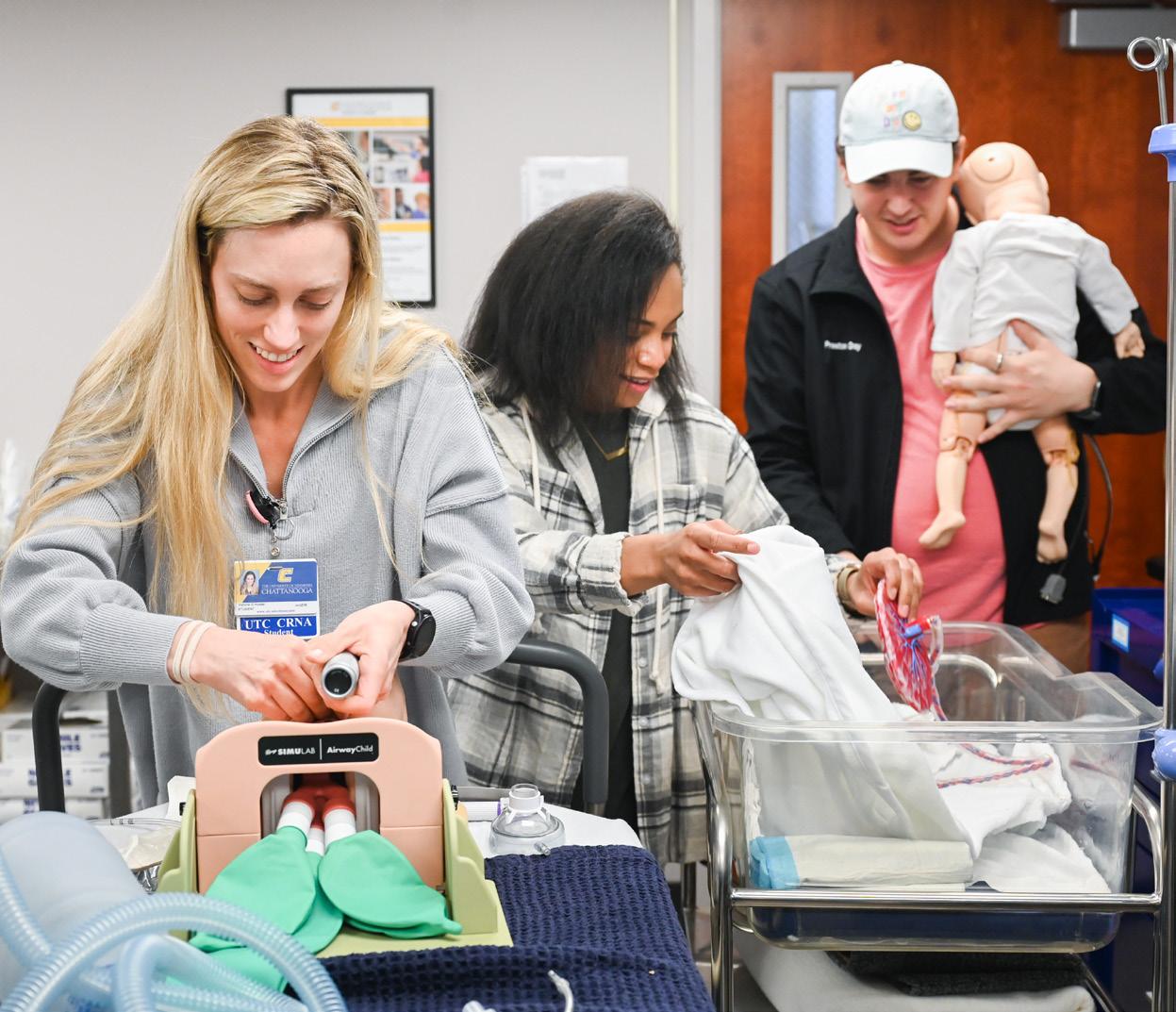



The University of Tennessee at Chattanooga’s mobile nursing unit is tapping into a powerful resource: a collaborative, interprofessional team designed to deliver essential health services directly to rural communities. This program brings together students and professionals from nursing, nutrition, social work, public health and occupational therapy, each contributing specialized skills to support older adults and their caregivers.
Led by Dr. Kristi Wick, Vicky B. Gregg Chair in Gerontology, the mobile unit is set to launch in early 2025.
Preparations underway now are critical to the program’s long-term success.
“It’s not just about bringing the mobile unit to communities; it’s about building trust, listening to the needs of each area, and addressing care gaps together,” Wick says.
The unit will deliver services like routine check-ups, chronic disease management and preventative care to regions where health care access is limited. This professional-led model complements a separate faith-based initiative at UTC that trains volunteers and local leaders in caregiving, empowering communities to offer ongoing support.
“We knew we couldn’t be everywhere at once,” Wick says, “so we partnered with local leaders to extend care beyond our direct reach, training them in caregiving, chronic disease management and fall prevention. Now, these communities can support their older members even when we’re not there.”
The mobile health model addresses a pressing issue: 22 Tennessee counties have no local hospitals, and 13 rural hospitals have closed since 2010. By empowering local volunteers, UTC is building a network that keeps care available long after the mobile unit moves on.
“This work isn’t just about addressing immediate health care needs—it’s laying the foundation for sustainable care in rural and underserved communities.”
The mobile unit not only builds community capacity but also offers UTC nursing students hands-on experience in interdisciplinary care. These students learn alongside peers and professionals in nutrition, social work, public health and occupational therapy—teaching valuable skills for future integrated health roles. By partnering with senior centers, the mobile health team reaches older adults and caregivers in familiar settings where they socialize and receive community support.
“Students aren’t just learning to deliver health care—they’re gaining firsthand experience in collaborative, community-based care, a skill essential for the shift toward interdisciplinary health models,” Wick says.
One key innovation is the telehealth component. Volunteers from local groups and senior centers are trained to assist older adults with digital health care tools, opening new pathways to care for those who struggle with in-person visits. Wick says this has been crucial in overcoming the geographic barriers these communities face.
This work isn’t just about addressing immediate health care needs— it’s laying the foundation for sustainable care in rural and underserved communities. By teaching nurses to build capacity through relationships, both with the community and other professions, UTC is developing a model that can be scaled and replicated in other regions.
“The scalability of this program comes from building community support,” Wick says. “We’re teaching people to care for themselves and their neighbors.”

Kynedi Jennings wants to help people. Others have taken notice. Jennings, a sophomore pre-nursing major at the University of Tennessee at Chattanooga, was one of six students statewide to receive the 2024 BlueCross Power of We Health Equity Scholarship. The $10,000 award, funded by the BlueCross BlueShield of Tennessee Foundation, recognizes students for leadership, community service, academic excellence and their commitment to improving health equity in Tennessee.
“The Power of We Scholarship will help me complete my education and make a positive impact in the lives of my future patients,” Jennings says. “I want to be in the best position possible to provide women with the care, information and resources to be healthy.”
The Collierville, Tennessee, native is passionate about becoming a labor and delivery nurse, and her long-term goal is to become a nurse practitioner. Her commitment to maternal health stems from personal experience.
“My mother shared details of her prenatal experience during her pregnancy with me, which included receiving some grossly misguided advice,” she explains. “I also notice many young women today becoming pregnant without receiving the appropriate information and care needed to stay healthy and ensure their babies’ well-being. I want to change that.”
Jennings has been dedicated to serving others throughout her life. In high school, she logged over 300 hours in leadership development and community service through the Memphis Bridge Builders Youth Program and also participated in the Leadership Collierville Youth Program.
Since coming to UTC, Jennings has balanced her nursing prerequisites with volunteering at a caregiving agency for veterans and helping at local homeless shelters.
“I just like helping people,” Jennings said. “Sometimes I’ll just be at home and I’ll have some bread or something—and I’ll just be like, ‘Let’s take peanut butter and jelly over there.’ I like to help everyone.”
“The Power of We Scholarship will help me complete my education and make a positive impact in the lives of my future patients,” Jennings says.


In classrooms charged with ambition and urgency, students at the University of Tennessee at Chattanooga commit themselves to one of the most intense challenges of their lives: becoming a nurse in just one year.
They’ve traded previous careers or academic paths for an accelerated, three-semester journey in the UTC School of Nursing, fast-tracking themselves into the workforce to meet the urgent demand for health care professionals.
Designed for students who already hold undergraduate degrees in other fields, the Accelerated Bachelor of Science in Nursing program allows them to bypass general education courses and jump straight into the nursing program. In one jam-packed year, ABSN students complete 59 credit hours, including more than 950 clinical hours, preparing them to make an immediate impact in Chattanooga and beyond.
The program doesn’t cut any corners. Students may skip general education classes, but the nursing curriculum remains as comprehensive as in a traditional program. And it’s fully immersive.
“This ABSN program is like being dropped into a foreign country to learn a new language,” says Dr. Jason Peter, the Mary B. Jackson assistant professor and ABSN program coordinator. “They live and breathe nursing from day one. The pace is fast, but the outcome is the same: our graduates are fully prepared to hit the ground running.”
Douglas Wilson, a former financial adviser from New York City, found that nursing offered the kind of meaningful work he had been searching for.
“I enjoyed my work in finance, but I kept feeling like something was missing,” Wilson explains. “Nursing felt like a way to make a tangible difference in people’s lives. The program’s one-year duration was the perfect fit for me to make that transition.”
Leaving behind the fast-paced life of the Big Apple for the Scenic City, Wilson embraced the chance to study in a more relaxed environment.
“The program is intense, but the camaraderie with my classmates has made it easier. We’re all in this together, and it’s motivating to know we’re working toward a common goal.”
Of the 59 required credit hours in the ABSN program, more than a third are completed in clinical settings, ensuring students gain essential hands-on experience. This rigorous training is a cornerstone of the program.
“They’re completing over 950 hours of clinical work in just three semesters,” Peter says. “By the time they graduate, they’re not just ready—they’re eager to get into the workforce and make an impact.”
For Chattanooga native Taniya Nichols, the accelerated nursing program was a perfect fit. With a young child at home, she needed a path that wouldn’t take years to finish.
Nichols, who is now one of the first graduates from the inaugural cohort and working in labor and delivery at Erlanger Hospital, says the program was about more than just a career change—it was about creating a future for her family.
“Graduation wasn’t just about earning my degree. It was about getting out there and helping people as quickly as I could,” Nichols says. “I’m already making a difference, and I wouldn’t trade that for anything.”
For Wilson, the ABSN program has provided a new beginning in a field with endless possibilities.
“I’m hoping this will make my life somewhat of a ‘choose your own adventure,’” he says. “Nursing offers flexibility and security that are hard to find elsewhere.”
Whether they’re transitioning from another career or balancing family responsibilities, students in the program are entering the workforce ready to make a difference.
“We need nurses now,” Nichols says, “and this program helped me get there faster.”



Meet UTC Distinguished Alum Dr. Ken Grubbs

The University of Tennessee at Chattanooga School of Nursing is proud to honor Dr. Ken Grubbs (’97, ’20) as the 2024 Distinguished Alumni Award recipient. As executive vice president and chief nursing officer for The Joint Commission, Grubbs oversees the quality standards for over 22,000 health care organizations nationwide, shaping the future of patient care.
His career began in the high-stakes world of emergency nursing, and he quickly rose into leadership roles focused on emergency and intensive care services. Before earning his Doctor of Nursing Practice from UTC in 2020, he served as vice president of regulatory and accreditation at HCA Healthcare.
In this Q&A, Grubbs offers insights into the future of health care and shares advice for aspiring nurses and leaders, highlighting the power of a UTC nursing education to create lasting change.
How did your time at UTC prepare you for such a varied and successful career?
My time at UTC was foundational in so many ways. The nursing program didn’t just provide clinical knowledge; it also encouraged critical thinking in every situation. This was crucial not only for my development as a nurse but also in shaping my approach to leadership. UTC’s culture fostered both academic growth and exposure to leadership opportunities, which prepared me for the diverse roles I’ve taken on in my career. It’s one of the best investments I made in myself, and the value continues to pay dividends today.
What initially drew you to the nursing field, particularly emergency nursing, and how has that passion evolved over the years?
I actually began as a business major before realizing that I wanted a career aligned with my core beliefs—serving others and advancing humanity. Nursing, particularly emergency nursing, felt like the right fit because of its direct impact on patients during their most critical moments. Over the years, that initial passion has only deepened. Whether it’s being present in someone’s most vulnerable moment or sharing in their joy, nursing offers an opportunity to make a genuine difference in people’s lives. It’s an honor and a privilege that I’ve always cherished.
How has your clinical experience influenced your approach to leadership?
Clinical experience is invaluable when it comes to leadership. The critical thinking skills that nurses develop—assessing a situation, making quick but informed decisions—are directly transferable to executive leadership. In my roles, I always keep the patient at the center of every decision. When leaders prioritize patient care, the right choices tend to follow. This same principle applies when leading teams; servant leadership, which focuses on supporting and uplifting those around you, remains an essential approach in every situation.
The Joint Commission plays a critical role in health care quality and safety. What do you find most rewarding about your work there, and how do you see the future of health care quality evolving?
It’s incredibly fulfilling to know that my work helps to improve patient safety and quality across the nation. The future of health care quality will undoubtedly be shaped by innovation, particularly through technology like artificial intelligence. AI has the potential to enhance patient safety, reduce administrative burdens and streamline processes, allowing health care providers to focus more on direct patient care. As we move forward, the key will be balancing these technological advances with the human aspect of health care—keeping the patient and their safety at the heart of everything we do.
How will innovation continue in nursing education to prepare the next generation of health care leaders?
Institutions like UTC must remain committed to strong academic and clinical programs while evolving to meet the needs of a changing health care landscape. For example, the integration of AI into health care offers an area for significant innovation. Programs need to offer students real-world experiences and cutting-edge technology to prepare them for the future. Partnerships with health care organizations are also crucial to ensure that the education provided remains relevant and effective.
What advice would you offer to current nursing students or recent graduates?
For students, I’d say take the time to discover your clinical passion and immerse yourself in the experiences that resonate with you most. The connections you make and the mentors you find will play a significant role in your future. For recent grads, my advice is to seize every opportunity—no matter how small it may seem. Whether it’s working on a clinical process improvement team or taking on new challenges, these experiences can have a big impact on your career. And always remember to keep the patient at the center of everything you do.
